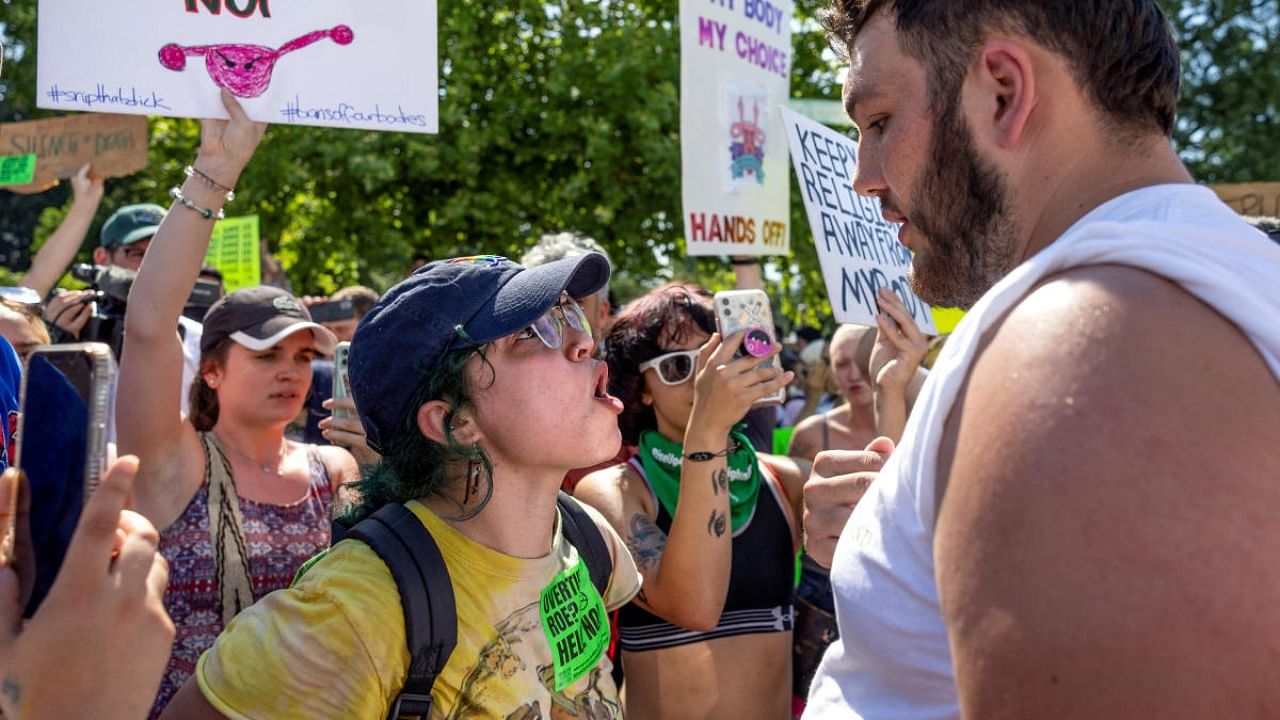
After carefully weighing whether she was ready to have a child, a 21-year-old woman in West Virginia called the state’s lone abortion clinic Thursday and scheduled an appointment for early July.
But a day later, a clinic employee called to tell the woman that her appointment would be canceled. The Women’s Health Center of West Virginia, which had been operating in Charleston since 1973, had ended all appointments, fearing that a law from the 1800s that criminalised the procedure was suddenly in effect again after the Supreme Court overturned Roe v. Wade.
“When I went to bed, I had my appointment and everything was set, and then today it’s like pre-1973,” the woman said, speaking on condition of anonymity because she feared her parents would disown her if they knew she was planning to have an abortion.
It is a scene that was playing out across the United States this weekend in the nine states with trigger laws, which quickly outlawed abortion, as well as in West Virginia and Wisconsin, where officials are trying to determine whether century-old bans may now be valid again.
The attorney general in West Virginia said Friday that he would soon issue an opinion on the legal status of abortion in his state.
For medical providers, abortion clinics and pregnant women, the shift has been sudden and jarring. Clinics have canceled appointments out of fear of prosecution. Women are scrambling to find treatment in neighboring states. And advocates are trying to raise money to transport women to clinics that remain open but are often far away.
In Arkansas, where a trigger law banning abortions went into effect Friday, 17 patients had been scheduled for abortions at Little Rock Family Planning Services, but none were performed before the Supreme Court’s decision shut down operations. About 30 more patients had been scheduled for an ultrasound and a consultation that were required under Arkansas’ previous law before women could get an abortion.
Lori Williams, the clinic director, said some patients had traveled from Texas and Oklahoma. Clinic employees had to contact patients and tell them not to come for their appointments.
The Yellowhammer Fund, which is based in Alabama and provides financial support to women seeking abortions, has received an influx of calls in the past day from people confused about the changing laws and seeking guidance and money to travel elsewhere for abortions.
“People who had appointments for next week no longer have appointments,” said Laurie Bertram Roberts, executive director of the fund. “The person who runs the call line is very overwhelmed.”
In Milwaukee, women who called the Affiliated Medical Services abortion clinic were met with a recorded message that said abortions were no longer available.
“We are saddened by this decision and how it will impact women everywhere,” the message said, suggesting patients travel to Illinois or Minnesota, where abortions are still legal.
The closest clinic to the shuttered Milwaukee facility is a Planned Parenthood facility in Waukegan, Illinois, just across the border from Wisconsin, which opened in 2020 in anticipation of a moment like this.
“We’ve been preparing for this for years,” said Mary Jane Maharry, a spokesperson for Planned Parenthood of Illinois.
Maharry said that the facility had been inundated with calls since the Supreme Court’s decision and that it was looking to hire additional staff members to prepare for 20,000 to 30,000 more patients coming from outside the state each year. Since it opened, the clinic has provided services to about 1,000 women from outside the state each year.
The 21-year-old woman in West Virginia said she had initially been in shock when she learned her appointment was canceled, crying so much that she got a headache. Then, she said, she quickly went into “survival mode,” researching which states were banning abortion and where she could travel to get one. Eventually, she found an abortion clinic in Roanoke, Virginia, about four hours away, and made an appointment for Wednesday. But she said she will remain anxious until then.
“I’m just hoping, like, can I just make it to Wednesday,” she said. “I just need to make it to Wednesday.”